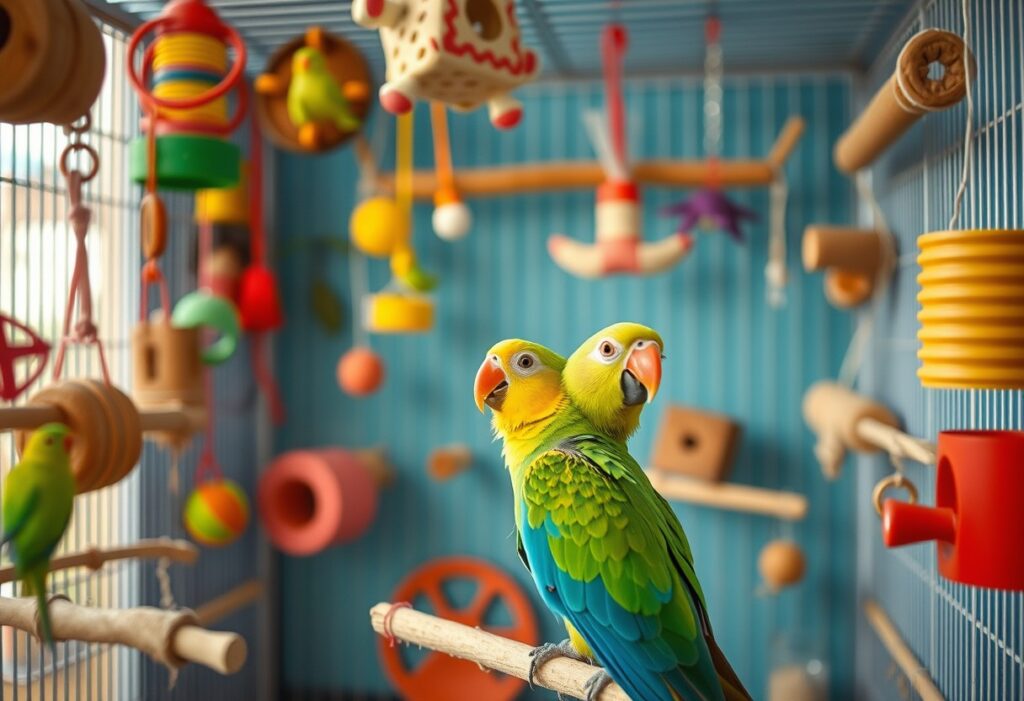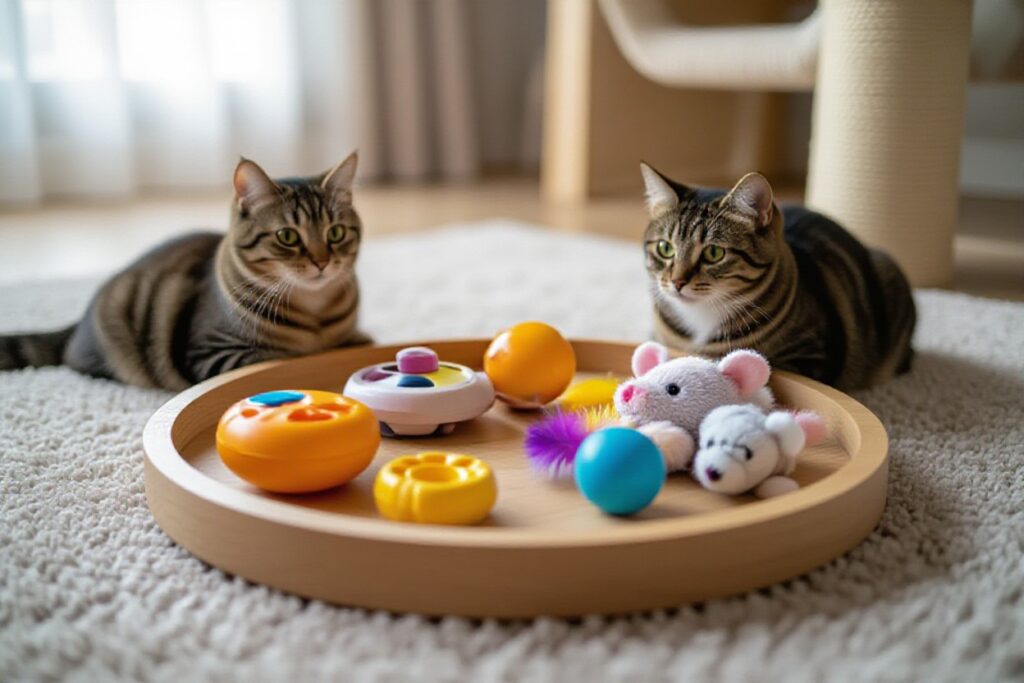Benefits of enrichment activities for birds are numerous and crucial for their overall well-being. By engaging your feathered friends in stimulating tasks and play, you can minimize stress and discourage unwanted behaviors that stem from boredom. Enrichment not only promotes mental stimulation and physical health but also encourages natural behaviors, enhancing your bird’s quality of life. Providing a variety of activities keeps your pet active and happy, ultimately allowing you to enjoy a more fulfilling companionship with your beloved avian mate.
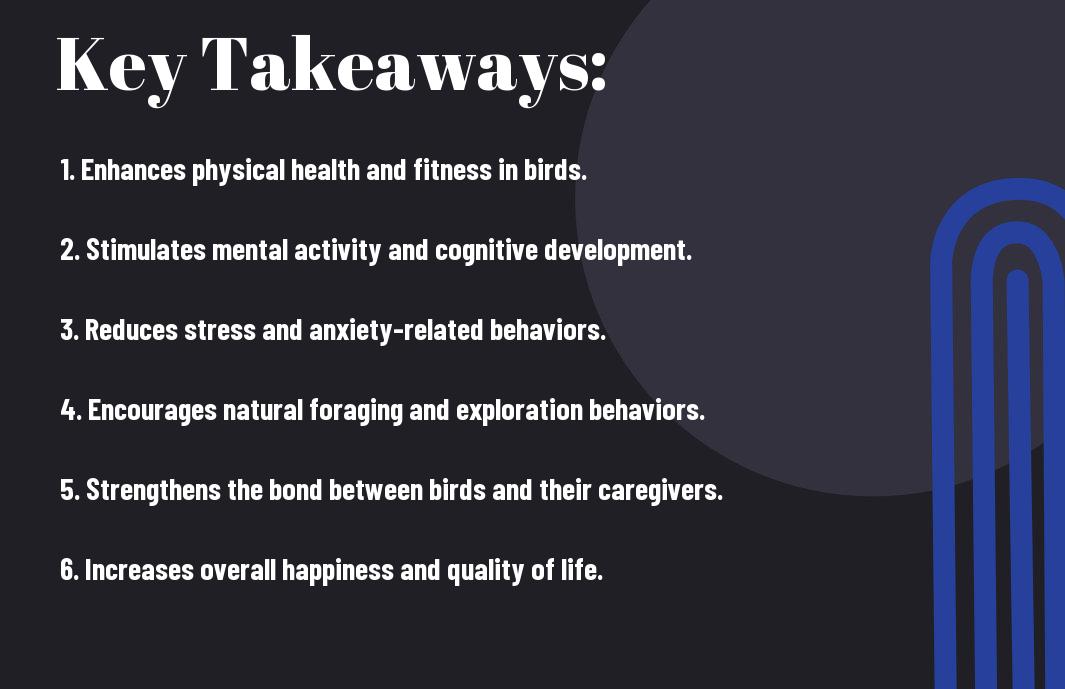
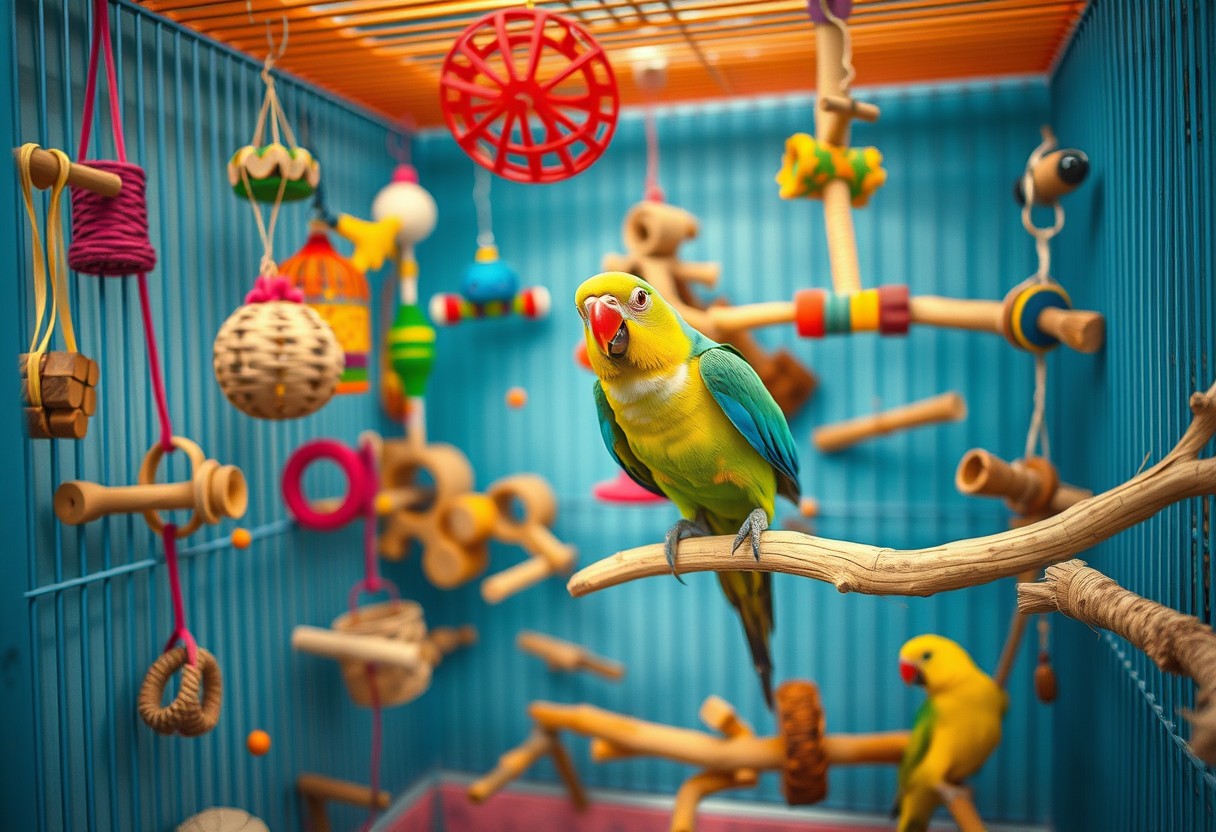
Understanding Enrichment Activities
A vital aspect of ensuring your pet bird thrives lies in understanding what enrichment activities are and how they can benefit your feathered friends.
Definition of Enrichment
Enrichment is a term that refers to activities designed to enhance the physical and psychological well-being of animals, including birds. These activities encourage natural behaviors and provide stimulation that is often lacking in captivity. For instance, enrichment can involve the introduction of new toys, food puzzles, or even social interactions, all of which serve to keep your bird engaged and happy.
Types of Enrichment Activities
Your bird’s enrichment activities can be broadly categorized into several types, aimed at stimulating their mind, body, and social behaviors. Understanding these types will allow you to provide a more comprehensive and fulfilling environment for your pet. Here’s a breakdown of the main categories:
| Physical Enrichment | Activities that promote physical activity, such as climbing structures and swings. |
| Mental Enrichment | Puzzles and interactive toys that challenge your bird’s intellect. |
| Social Enrichment | Opportunities for social interaction with other birds or people. |
| Environmental Enrichment | Changes in the living space, accents, or safe exploration areas for your bird. |
| Food Enrichment | Diverse and stimulating feeding methods, such as scatter feeding or treat puzzles. |
Some of the most beneficial enrichment activities include those that mimic your bird’s natural habitat, providing them with the opportunity to explore and engage with their surroundings. Physical enrichment enables your bird to exercise, while mental stimulation helps keep their cognitive abilities sharp. Additionally, incorporating elements of social interaction can greatly enhance your bird’s emotional health. Assume that by providing a well-rounded mix of activities, you’ll foster a more lively and healthier bird.
- Natural behavior stimulation
- Physical play areas
- Interactive toys
- Social bonding exercises
- Food challenges
Importance of Enrichment
Understanding the importance of enrichment activities in your bird’s life is crucial. Birds, by nature, are meant to be active, curious beings. When deprived of stimulation, they can develop behavior issues like feather plucking, aggression, or depression. As a responsible bird owner, it’s critical to recognize that these activities are not merely optional; they are necessary for your pet’s well-being. By fostering an engaging environment, you contribute positively to their quality of life. Assume that when you prioritize their enrichment, you will witness a greater sense of happiness and vitality in your bird.
| Boredom prevention | Regularly changing activities reduces boredom. |
| Behavioral improvement | Enrichment can reduce negative behaviors. |
| Physical health | Encouraged exercise leads to better health. |
| Enhanced bonding | Shared activities can strengthen your bond. |
| Emotional well-being | Enriched environments promote emotional balance. |
Psychological Benefits of Enrichment
Even the most sociable and intelligent birds can experience psychological challenges if their environment lacks stimulation. When birds are confined to a monotonous setting, they may display signs of boredom and stress, which can lead to behavioral issues. Implementing various enrichment activities allows you to create a stimulating atmosphere that not only prevents these negative behaviors but also nurtures a happier and healthier bird. When you provide your feathered friend with diverse experiences, you enhance their quality of life significantly.
Reducing Boredom and Stress
Stress can manifest in birds through feather plucking, excessive vocalization, or aggression towards their environment or companions. By introducing enrichment activities such as foraging toys, puzzle feeders, or interactive playtimes, you stimulate their natural instincts and divert their attention away from stressors. This engagement makes your bird feel more accomplished and less anxious, promoting an environment where they can thrive both mentally and emotionally.
Moreover, a lack of engaging activities can lead to feelings of loneliness and frustration, as birds are naturally curious beings. By taking the time to incorporate various social and physical enrichment opportunities into your bird’s daily routine, you can reduce the risk of behavioral problems. You are not just mitigating negative feelings; you’re also paving the way for a more **dynamic** and **contented** companion.
Enhancing Cognitive Functions
To ensure your bird remains mentally sharp, cognitive functions should be continuously challenged and enhanced. Birds are highly intelligent creatures, and when you provide cognitive enrichment, you stimulate their minds and encourage problem-solving skills. Activities like puzzle toys, training sessions, or introducing new objects for exploration can significantly boost their mental acuity. Studies have shown that mentally engaged birds not only exhibit greater emotional well-being but also tend to demonstrate enhanced learning abilities.
It is important to remember that cognitive stimulation allows your bird to tap into their natural instincts, such as foraging and exploring. By participating in activities that challenge their intellect, you create an environment that encourages **curiosity** and **discovery**. Furthermore, this engagement can result in stronger bonding experiences between you and your bird, as you become part of their learning process. Over time, the benefits of cognitive enrichment can lead to a more balanced and well-rounded personality for your feathered friend, ensuring they enjoy their life both mentally and emotionally.
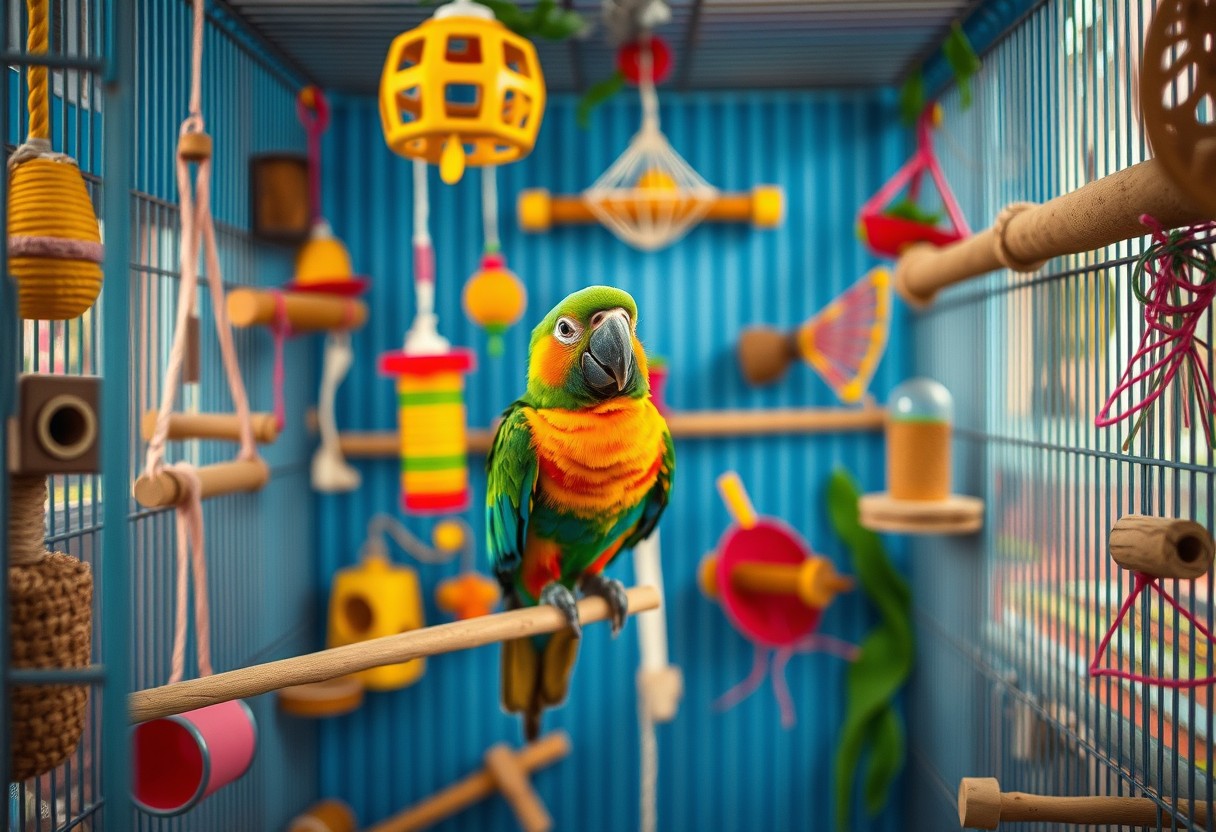
Physical Benefits of Enrichment
Once again, the importance of enrichment activities showcases its invaluable impact on the overall well-being of your feathered friends. Enrichment not only engages their minds but also significantly contributes to their physical health. When birds engage in various activities designed to stimulate their natural instincts, you will notice that they are healthier, more active, and ultimately lead a higher quality of life. Birds that lack adequate physical engagement might suffer from various health issues, including obesity and muscle atrophy. Hence, incorporating enrichment activities into their routine is important for their long-term physical development.
Promoting Physical Exercise
An important component of bird care is ensuring that they engage in sufficient physical exercise. Enrichment activities, such as climbing structures, swings, and toys, encourage your bird to be active. By creating an environment rich in physical challenges, you help your pet develop strong muscles and enhance their coordination and agility. As your bird climbs, flaps, and navigates through different materials, they experience a wide range of movements that serve their well-being.
Moreover, regular physical activity reduces the risk of developing serious health issues associated with a sedentary lifestyle. It’s vital that you provide your bird with engaging exercises that cater to their species-specific needs. Not only will this promote physical fitness, but your bird will also enjoy the opportunity to explore and play. Ultimately, the more fun and challenging the enrichment activities, the happier and healthier your feathered companion will be.
Encouraging Natural Foraging Behaviors
Encouraging your bird to engage in natural foraging behaviors is another critical aspect of enrichment that greatly benefits their physical health. Birds in the wild spend a considerable portion of their day searching for food, a behavior that’s important to their survival. By providing them with opportunities to forage, such as hiding their food in puzzles or challenging toys, you mimic this instinctual drive. This not only keeps them mentally stimulated but also encourages them to move around and exercise as they search and retrieve their food.
It is important to understand that without opportunities to forage, your bird may become bored and sedentary, leading to serious physical implications. When you introduce foraging activities, you boost your bird’s physical fitness and support their mental well-being. Behavioral problems can also diminish when birds feel more fulfilled while engaging in activities that tap into their natural instincts. The combination of appropriate enrichment activities will contribute to a happier, healthier bird that thrives in your care.
Implementing Enrichment Activities
Not only do enrichment activities promote mental and physical stimulation for your birds, but they also help strengthen your bond with them. Engaging your feathered friends in various tasks can significantly enhance their overall happiness and well-being. However, the key to successful enrichment lies in implementing the right activities that cater to your birds’ specific needs and preferences.
Choosing the Right Activities
Activities should be tailored to the species, personality, and behavioral traits of your bird. For example, if you have a highly active bird like a cockatoo, you might want to include climbing structures, interactive toys, and puzzles that encourage flight and movement. On the other hand, a more reserved bird, such as a parakeet, may benefit from gentle foraging activities and toys that stimulate their curiosity without overwhelming them.
Additionally, it’s imperative to regularly rotate the activities and introduce new ones to keep your birds engaged. This can help to prevent boredom and the development of undesirable behavior, such as feather-plucking or excessive vocalizations. Bear in mind, your birds are intelligent creatures that thrive on challenges, so continually adapting their enrichment activities is crucial.
Monitoring and Adjusting Enrichment
To ensure that the enrichment activities you implement are effective, it’s vital to monitor your birds’ responses closely. Watch for signs of engagement or disinterest in the activities you provide. If you notice that your bird frequently ignores a particular toy or seems to be losing interest in the activities, it might be time to adjust your approach and introduce new challenges or more stimulating options.
It is also important to observe changes in your bird’s behavior, mood, and overall health. If your bird becomes overly aggressive or displays signs of stress or anxiety when engaging with certain activities, stop immediately, as this may indicate an unsuitable enrichment option. Pay attention to how your birds interact with their environment, and be willing to make changes to create a more balanced, positive experience. Carefully monitoring their reactions allows you to fine-tune the activities for optimal engagement and well-being.
Conclusion
On the whole, incorporating enrichment activities into your bird’s daily routine can significantly enhance its quality of life. These activities not only provide mental stimulation but also meet your feathered friend’s physical needs, reducing the likelihood of behavioral issues such as boredom or aggression. By engaging your bird with toys, puzzles, and interactive challenges, you enrich its environment, fostering a sense of exploration and activity. Investing time in creating diverse enrichment opportunities will enable your pet to thrive both mentally and physically, leading to a happier and healthier life.
Moreover, understanding the importance of enrichment will deepen your bond with your bird, as you observe its natural behaviors and preferences unfold in response to various activities. The effort you put into enriching your bird’s habitat pays off in the form of a more dynamic and fulfilled companion. Keep in mind, the benefits of providing enrichment activities extend beyond mere entertainment; they are important for your bird’s overall well-being and enriched life experience. Embrace these opportunities to enhance your bird’s environment and enjoy the rewarding connection that comes with it.
FAQ
Q: What are enrichment activities for birds and why are they important?
A: Enrichment activities for birds refer to various physical and mental exercises designed to stimulate their natural behaviors and enhance their well-being. These activities can include toys, puzzles, social interactions, foraging opportunities, and varied environmental settings. They are crucial because they help prevent boredom, reduce stress, and promote physical health by encouraging exercise and mental engagement. Birds, being naturally active and intelligent creatures, require stimulation to thrive both mentally and physically.
Q: How can I implement enrichment activities for my pet bird at home?
A: Implementing enrichment activities for your pet bird can be simple and cost-effective. Begin by providing a variety of toys that challenge their problem-solving skills, such as puzzle toys that dispense treats. You can also create foraging opportunities by hiding snacks throughout their cage or environment. Additionally, incorporate safe natural branches, swings, and ropes to encourage climbing and movement. Changing the layout of their cage and rotating toys regularly can also introduce novelty, keeping your bird engaged and curious.
Q: What types of enrichment are most beneficial for different species of birds?
A: The types of enrichment that are beneficial can vary by species due to differences in their natural behaviors and habitats. For example, parrots often enjoy toys that require beaking and chewing, like wood or paper-based options, while finches may prefer straightforward foraging activities with their food. Larger birds, such as cockatoos, may benefit from puzzle toys that challenge their intelligence, while smaller birds might thrive with opportunities for social interaction or flight space. It’s important to research your specific bird’s species to tailor enrichment activities to their needs and preferences, ensuring a fulfilling environment.
